Reflective Essay: Addressing Indifferent Discipline in the Classroom
VerifiedAdded on 2022/08/26
|8
|1153
|18
Essay
AI Summary
This reflective essay delves into the critical aspects of classroom management, particularly focusing on student discipline and the challenges posed by indifferent behavior. The essay identifies disciplinary problems, such as indifference, and explores their impact on students' learning abilities and classroom dynamics. It examines various strategies for teachers and educational leaders to address these issues, including understanding individual student issues, building positive relationships, and setting a proper example. The essay emphasizes the importance of transparency, active monitoring of student behavior, and modifying the classroom environment to promote effective discipline. It reflects on the evolution of the author's perspective, highlighting the need for unbiased and conscious approaches to student discipline, and concludes with practical applications for new graduates in the field. The essay also references multiple sources to support the arguments.

Running head: REFLECTIVE ESSAY
REFLECTIVE ESSAY
REFLECTIVE ESSAY
Paraphrase This Document
Need a fresh take? Get an instant paraphrase of this document with our AI Paraphraser
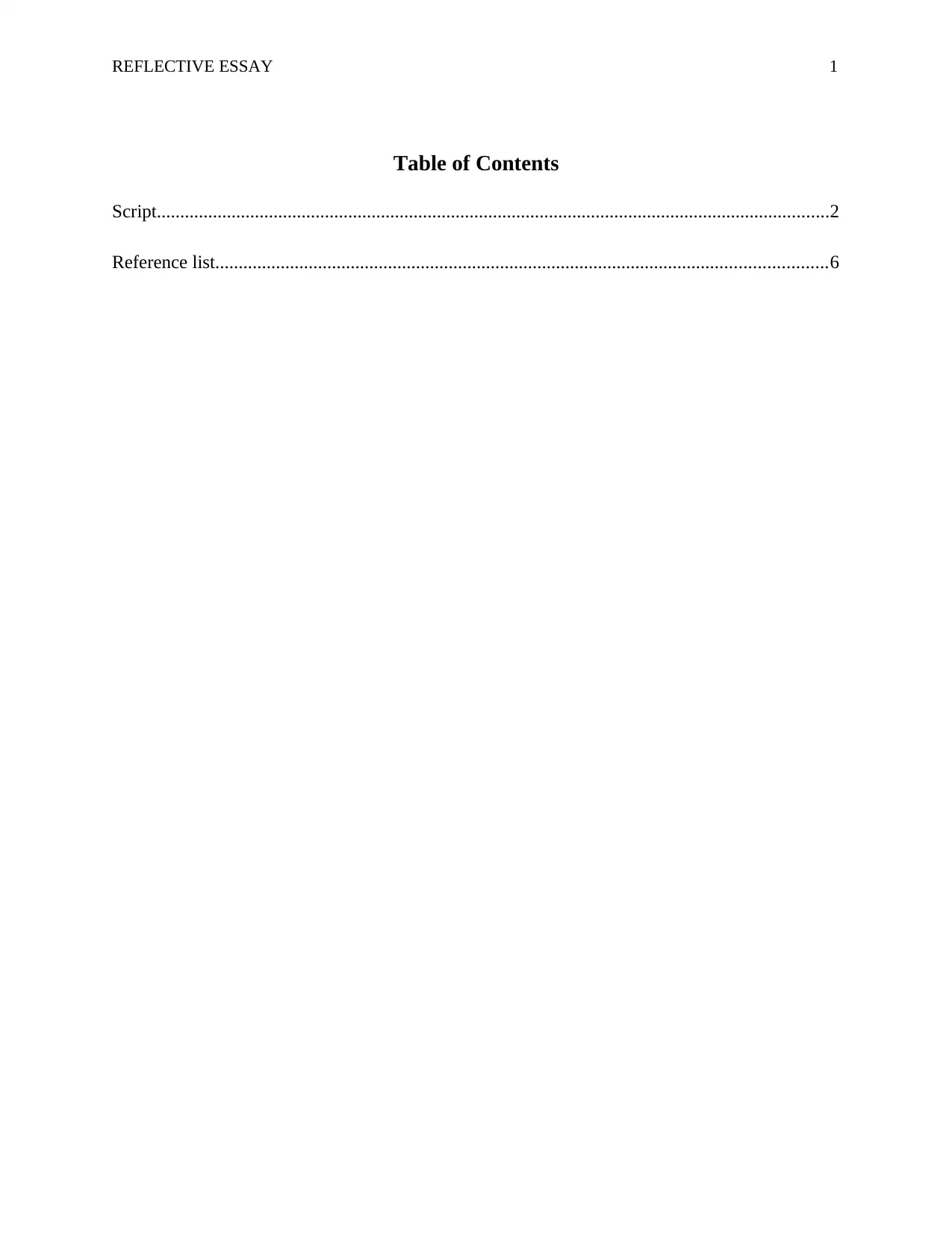
REFLECTIVE ESSAY 1
Table of Contents
Script................................................................................................................................................2
Reference list...................................................................................................................................6
Table of Contents
Script................................................................................................................................................2
Reference list...................................................................................................................................6
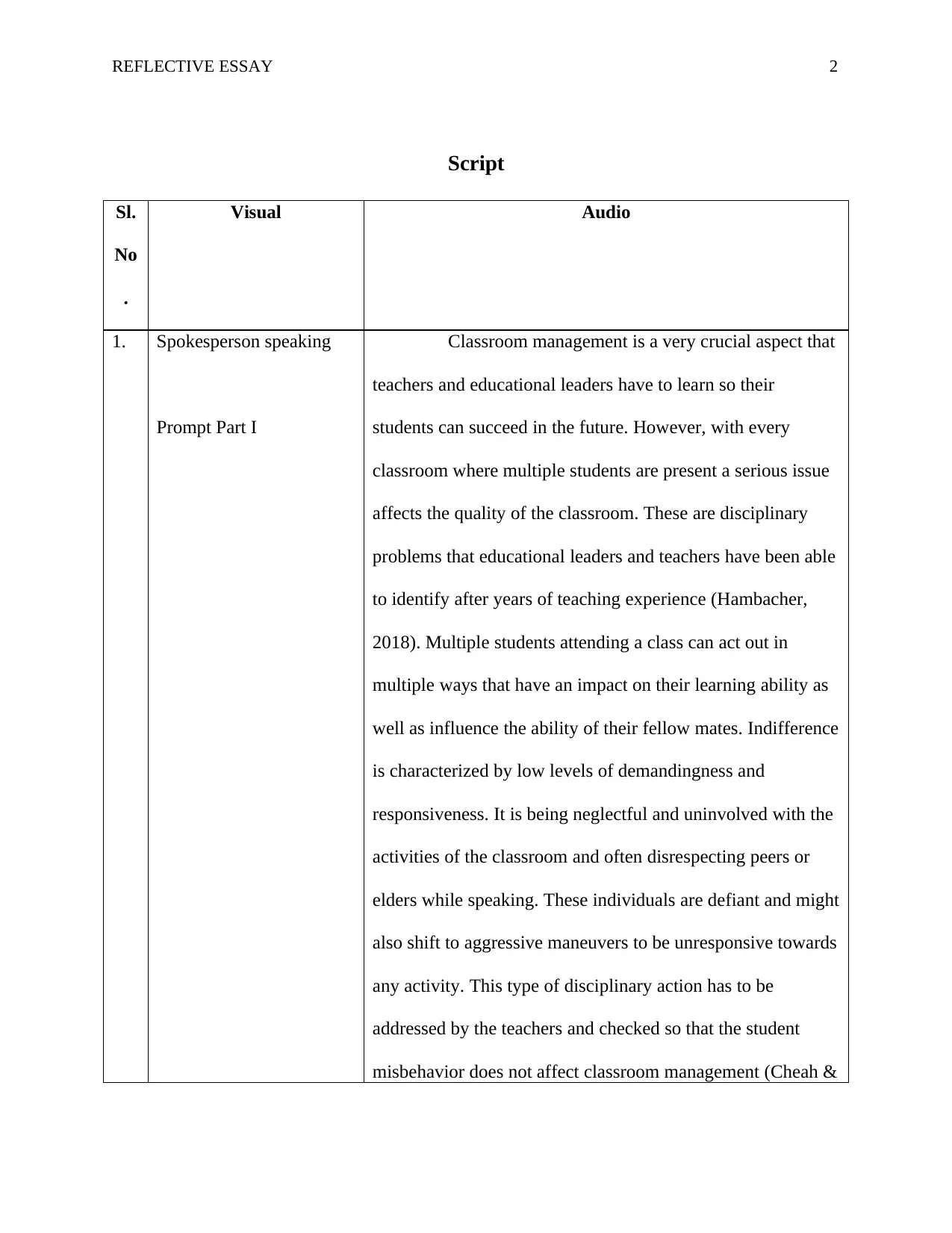
REFLECTIVE ESSAY 2
Script
Sl.
No
.
Visual Audio
1. Spokesperson speaking
Prompt Part I
Classroom management is a very crucial aspect that
teachers and educational leaders have to learn so their
students can succeed in the future. However, with every
classroom where multiple students are present a serious issue
affects the quality of the classroom. These are disciplinary
problems that educational leaders and teachers have been able
to identify after years of teaching experience (Hambacher,
2018). Multiple students attending a class can act out in
multiple ways that have an impact on their learning ability as
well as influence the ability of their fellow mates. Indifference
is characterized by low levels of demandingness and
responsiveness. It is being neglectful and uninvolved with the
activities of the classroom and often disrespecting peers or
elders while speaking. These individuals are defiant and might
also shift to aggressive maneuvers to be unresponsive towards
any activity. This type of disciplinary action has to be
addressed by the teachers and checked so that the student
misbehavior does not affect classroom management (Cheah &
Script
Sl.
No
.
Visual Audio
1. Spokesperson speaking
Prompt Part I
Classroom management is a very crucial aspect that
teachers and educational leaders have to learn so their
students can succeed in the future. However, with every
classroom where multiple students are present a serious issue
affects the quality of the classroom. These are disciplinary
problems that educational leaders and teachers have been able
to identify after years of teaching experience (Hambacher,
2018). Multiple students attending a class can act out in
multiple ways that have an impact on their learning ability as
well as influence the ability of their fellow mates. Indifference
is characterized by low levels of demandingness and
responsiveness. It is being neglectful and uninvolved with the
activities of the classroom and often disrespecting peers or
elders while speaking. These individuals are defiant and might
also shift to aggressive maneuvers to be unresponsive towards
any activity. This type of disciplinary action has to be
addressed by the teachers and checked so that the student
misbehavior does not affect classroom management (Cheah &
⊘ This is a preview!⊘
Do you want full access?
Subscribe today to unlock all pages.

Trusted by 1+ million students worldwide
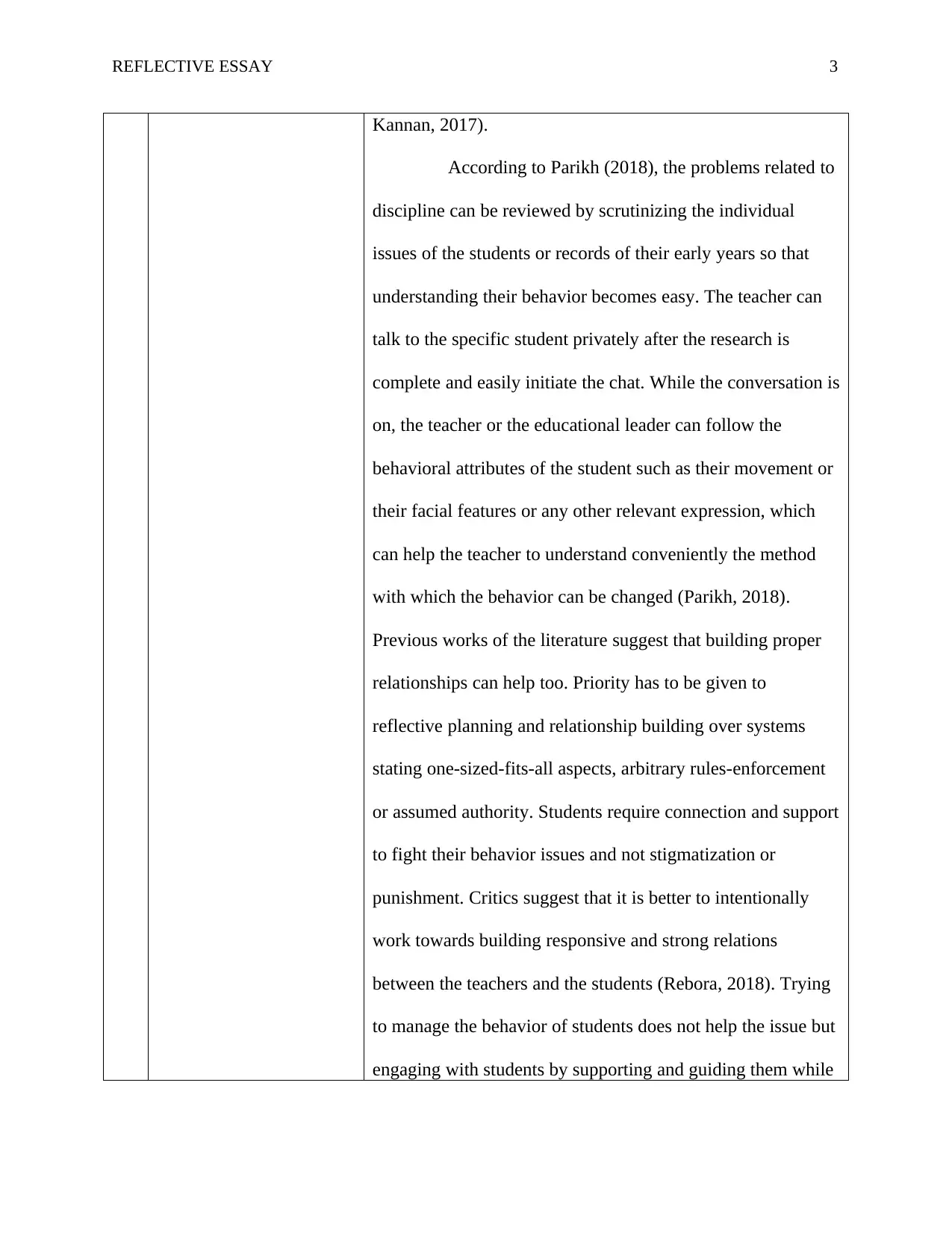
REFLECTIVE ESSAY 3
Kannan, 2017).
According to Parikh (2018), the problems related to
discipline can be reviewed by scrutinizing the individual
issues of the students or records of their early years so that
understanding their behavior becomes easy. The teacher can
talk to the specific student privately after the research is
complete and easily initiate the chat. While the conversation is
on, the teacher or the educational leader can follow the
behavioral attributes of the student such as their movement or
their facial features or any other relevant expression, which
can help the teacher to understand conveniently the method
with which the behavior can be changed (Parikh, 2018).
Previous works of the literature suggest that building proper
relationships can help too. Priority has to be given to
reflective planning and relationship building over systems
stating one-sized-fits-all aspects, arbitrary rules-enforcement
or assumed authority. Students require connection and support
to fight their behavior issues and not stigmatization or
punishment. Critics suggest that it is better to intentionally
work towards building responsive and strong relations
between the teachers and the students (Rebora, 2018). Trying
to manage the behavior of students does not help the issue but
engaging with students by supporting and guiding them while
Kannan, 2017).
According to Parikh (2018), the problems related to
discipline can be reviewed by scrutinizing the individual
issues of the students or records of their early years so that
understanding their behavior becomes easy. The teacher can
talk to the specific student privately after the research is
complete and easily initiate the chat. While the conversation is
on, the teacher or the educational leader can follow the
behavioral attributes of the student such as their movement or
their facial features or any other relevant expression, which
can help the teacher to understand conveniently the method
with which the behavior can be changed (Parikh, 2018).
Previous works of the literature suggest that building proper
relationships can help too. Priority has to be given to
reflective planning and relationship building over systems
stating one-sized-fits-all aspects, arbitrary rules-enforcement
or assumed authority. Students require connection and support
to fight their behavior issues and not stigmatization or
punishment. Critics suggest that it is better to intentionally
work towards building responsive and strong relations
between the teachers and the students (Rebora, 2018). Trying
to manage the behavior of students does not help the issue but
engaging with students by supporting and guiding them while
Paraphrase This Document
Need a fresh take? Get an instant paraphrase of this document with our AI Paraphraser
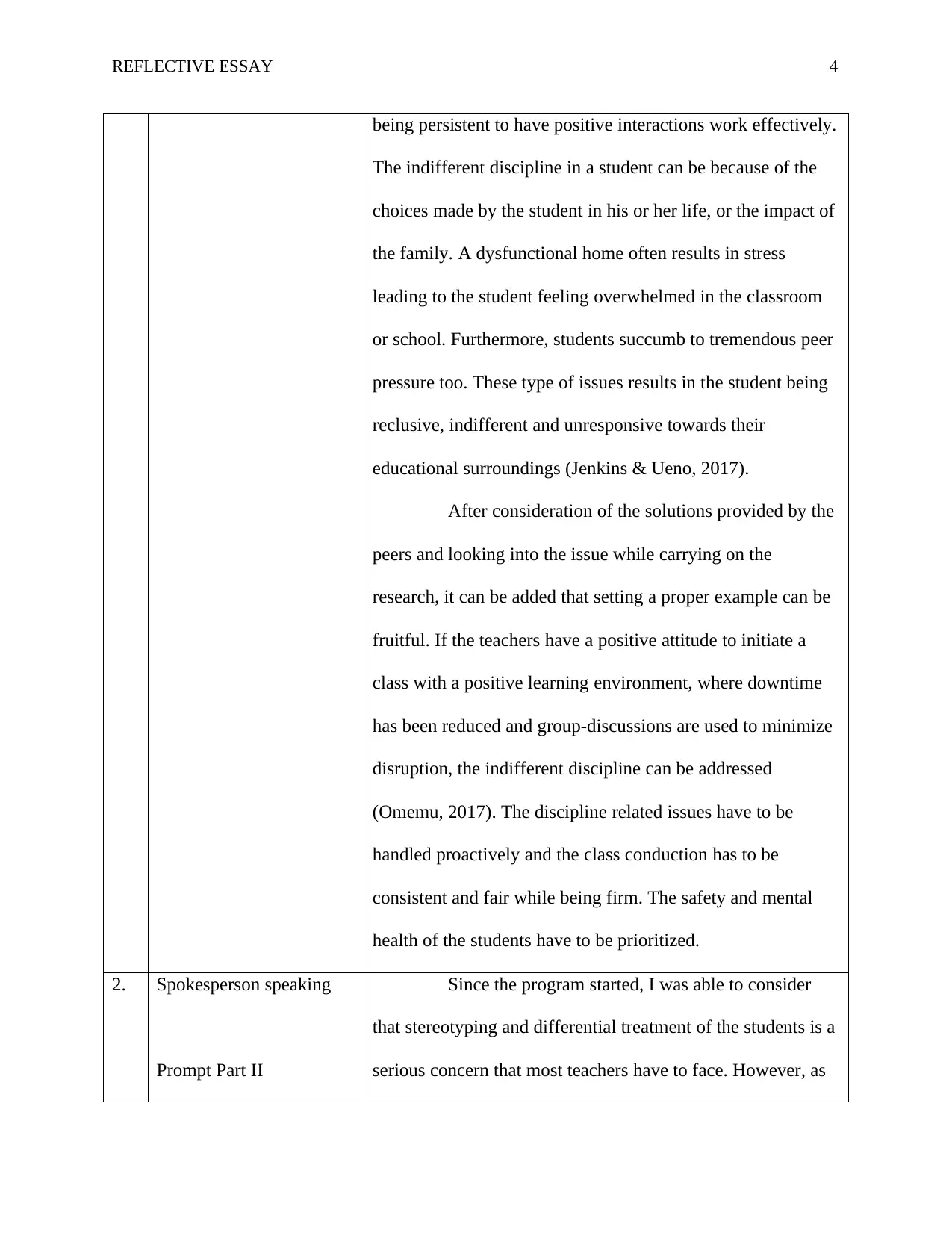
REFLECTIVE ESSAY 4
being persistent to have positive interactions work effectively.
The indifferent discipline in a student can be because of the
choices made by the student in his or her life, or the impact of
the family. A dysfunctional home often results in stress
leading to the student feeling overwhelmed in the classroom
or school. Furthermore, students succumb to tremendous peer
pressure too. These type of issues results in the student being
reclusive, indifferent and unresponsive towards their
educational surroundings (Jenkins & Ueno, 2017).
After consideration of the solutions provided by the
peers and looking into the issue while carrying on the
research, it can be added that setting a proper example can be
fruitful. If the teachers have a positive attitude to initiate a
class with a positive learning environment, where downtime
has been reduced and group-discussions are used to minimize
disruption, the indifferent discipline can be addressed
(Omemu, 2017). The discipline related issues have to be
handled proactively and the class conduction has to be
consistent and fair while being firm. The safety and mental
health of the students have to be prioritized.
2. Spokesperson speaking
Prompt Part II
Since the program started, I was able to consider
that stereotyping and differential treatment of the students is a
serious concern that most teachers have to face. However, as
being persistent to have positive interactions work effectively.
The indifferent discipline in a student can be because of the
choices made by the student in his or her life, or the impact of
the family. A dysfunctional home often results in stress
leading to the student feeling overwhelmed in the classroom
or school. Furthermore, students succumb to tremendous peer
pressure too. These type of issues results in the student being
reclusive, indifferent and unresponsive towards their
educational surroundings (Jenkins & Ueno, 2017).
After consideration of the solutions provided by the
peers and looking into the issue while carrying on the
research, it can be added that setting a proper example can be
fruitful. If the teachers have a positive attitude to initiate a
class with a positive learning environment, where downtime
has been reduced and group-discussions are used to minimize
disruption, the indifferent discipline can be addressed
(Omemu, 2017). The discipline related issues have to be
handled proactively and the class conduction has to be
consistent and fair while being firm. The safety and mental
health of the students have to be prioritized.
2. Spokesperson speaking
Prompt Part II
Since the program started, I was able to consider
that stereotyping and differential treatment of the students is a
serious concern that most teachers have to face. However, as
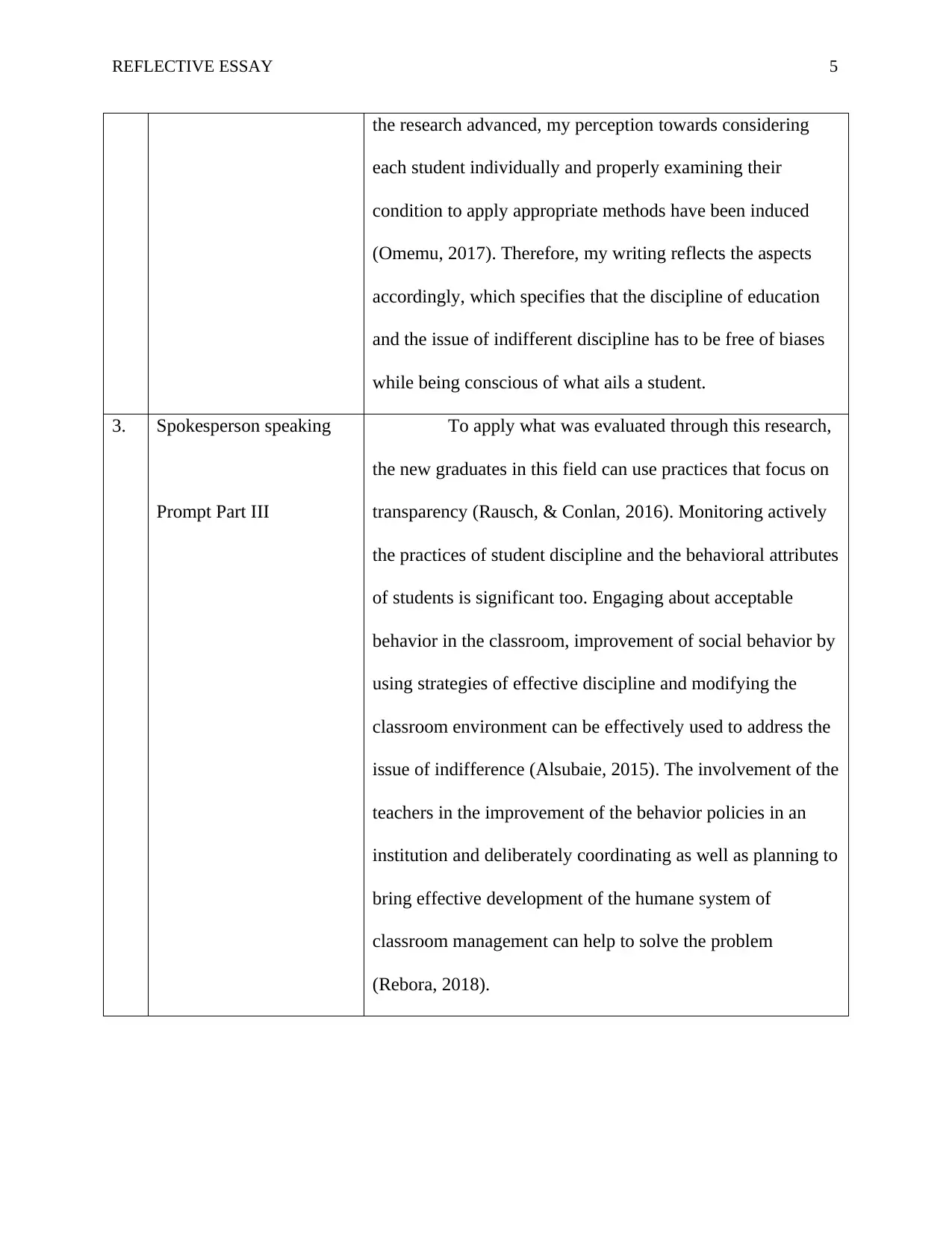
REFLECTIVE ESSAY 5
the research advanced, my perception towards considering
each student individually and properly examining their
condition to apply appropriate methods have been induced
(Omemu, 2017). Therefore, my writing reflects the aspects
accordingly, which specifies that the discipline of education
and the issue of indifferent discipline has to be free of biases
while being conscious of what ails a student.
3. Spokesperson speaking
Prompt Part III
To apply what was evaluated through this research,
the new graduates in this field can use practices that focus on
transparency (Rausch, & Conlan, 2016). Monitoring actively
the practices of student discipline and the behavioral attributes
of students is significant too. Engaging about acceptable
behavior in the classroom, improvement of social behavior by
using strategies of effective discipline and modifying the
classroom environment can be effectively used to address the
issue of indifference (Alsubaie, 2015). The involvement of the
teachers in the improvement of the behavior policies in an
institution and deliberately coordinating as well as planning to
bring effective development of the humane system of
classroom management can help to solve the problem
(Rebora, 2018).
the research advanced, my perception towards considering
each student individually and properly examining their
condition to apply appropriate methods have been induced
(Omemu, 2017). Therefore, my writing reflects the aspects
accordingly, which specifies that the discipline of education
and the issue of indifferent discipline has to be free of biases
while being conscious of what ails a student.
3. Spokesperson speaking
Prompt Part III
To apply what was evaluated through this research,
the new graduates in this field can use practices that focus on
transparency (Rausch, & Conlan, 2016). Monitoring actively
the practices of student discipline and the behavioral attributes
of students is significant too. Engaging about acceptable
behavior in the classroom, improvement of social behavior by
using strategies of effective discipline and modifying the
classroom environment can be effectively used to address the
issue of indifference (Alsubaie, 2015). The involvement of the
teachers in the improvement of the behavior policies in an
institution and deliberately coordinating as well as planning to
bring effective development of the humane system of
classroom management can help to solve the problem
(Rebora, 2018).
⊘ This is a preview!⊘
Do you want full access?
Subscribe today to unlock all pages.

Trusted by 1+ million students worldwide
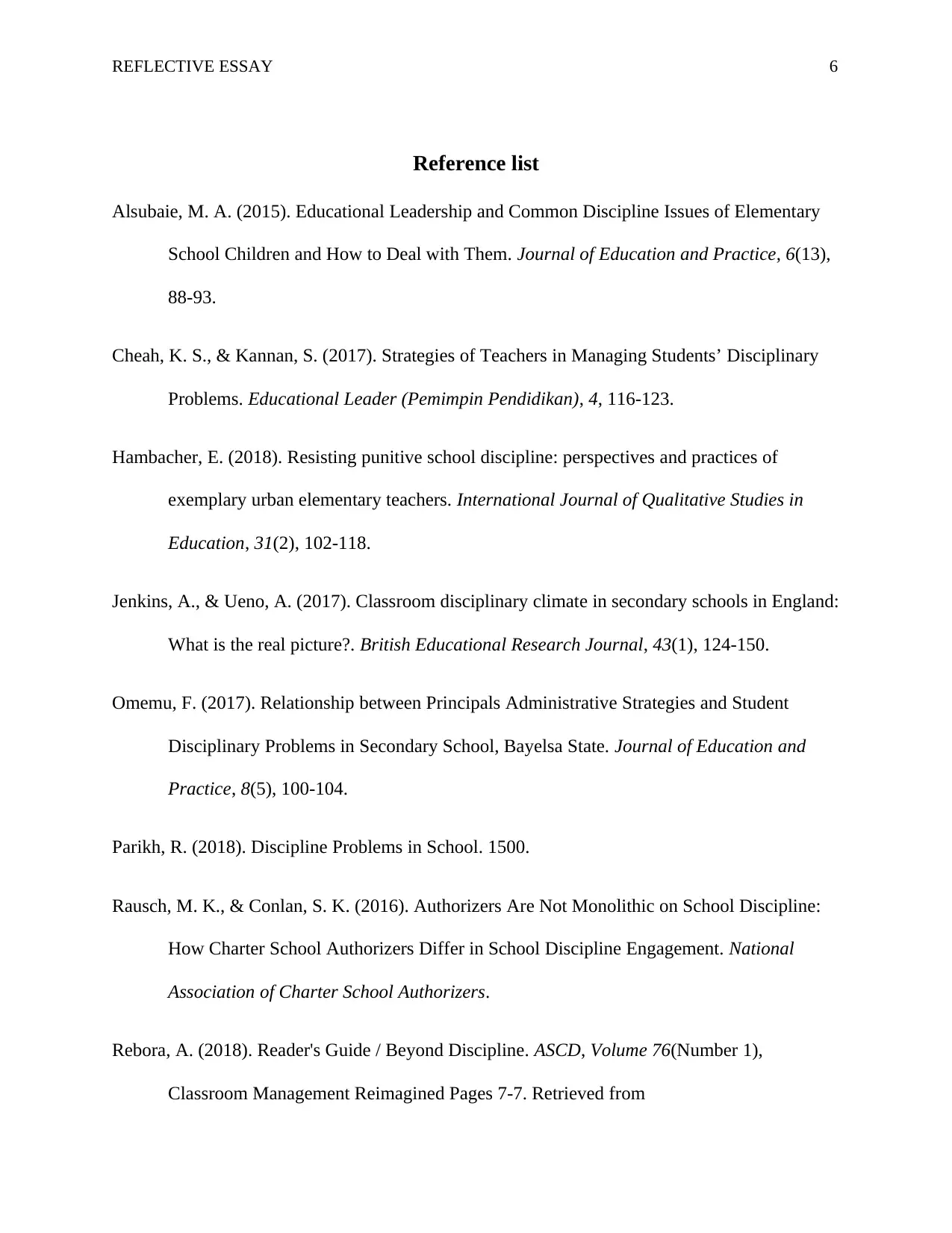
REFLECTIVE ESSAY 6
Reference list
Alsubaie, M. A. (2015). Educational Leadership and Common Discipline Issues of Elementary
School Children and How to Deal with Them. Journal of Education and Practice, 6(13),
88-93.
Cheah, K. S., & Kannan, S. (2017). Strategies of Teachers in Managing Students’ Disciplinary
Problems. Educational Leader (Pemimpin Pendidikan), 4, 116-123.
Hambacher, E. (2018). Resisting punitive school discipline: perspectives and practices of
exemplary urban elementary teachers. International Journal of Qualitative Studies in
Education, 31(2), 102-118.
Jenkins, A., & Ueno, A. (2017). Classroom disciplinary climate in secondary schools in England:
What is the real picture?. British Educational Research Journal, 43(1), 124-150.
Omemu, F. (2017). Relationship between Principals Administrative Strategies and Student
Disciplinary Problems in Secondary School, Bayelsa State. Journal of Education and
Practice, 8(5), 100-104.
Parikh, R. (2018). Discipline Problems in School. 1500.
Rausch, M. K., & Conlan, S. K. (2016). Authorizers Are Not Monolithic on School Discipline:
How Charter School Authorizers Differ in School Discipline Engagement. National
Association of Charter School Authorizers.
Rebora, A. (2018). Reader's Guide / Beyond Discipline. ASCD, Volume 76(Number 1),
Classroom Management Reimagined Pages 7-7. Retrieved from
Reference list
Alsubaie, M. A. (2015). Educational Leadership and Common Discipline Issues of Elementary
School Children and How to Deal with Them. Journal of Education and Practice, 6(13),
88-93.
Cheah, K. S., & Kannan, S. (2017). Strategies of Teachers in Managing Students’ Disciplinary
Problems. Educational Leader (Pemimpin Pendidikan), 4, 116-123.
Hambacher, E. (2018). Resisting punitive school discipline: perspectives and practices of
exemplary urban elementary teachers. International Journal of Qualitative Studies in
Education, 31(2), 102-118.
Jenkins, A., & Ueno, A. (2017). Classroom disciplinary climate in secondary schools in England:
What is the real picture?. British Educational Research Journal, 43(1), 124-150.
Omemu, F. (2017). Relationship between Principals Administrative Strategies and Student
Disciplinary Problems in Secondary School, Bayelsa State. Journal of Education and
Practice, 8(5), 100-104.
Parikh, R. (2018). Discipline Problems in School. 1500.
Rausch, M. K., & Conlan, S. K. (2016). Authorizers Are Not Monolithic on School Discipline:
How Charter School Authorizers Differ in School Discipline Engagement. National
Association of Charter School Authorizers.
Rebora, A. (2018). Reader's Guide / Beyond Discipline. ASCD, Volume 76(Number 1),
Classroom Management Reimagined Pages 7-7. Retrieved from
Paraphrase This Document
Need a fresh take? Get an instant paraphrase of this document with our AI Paraphraser
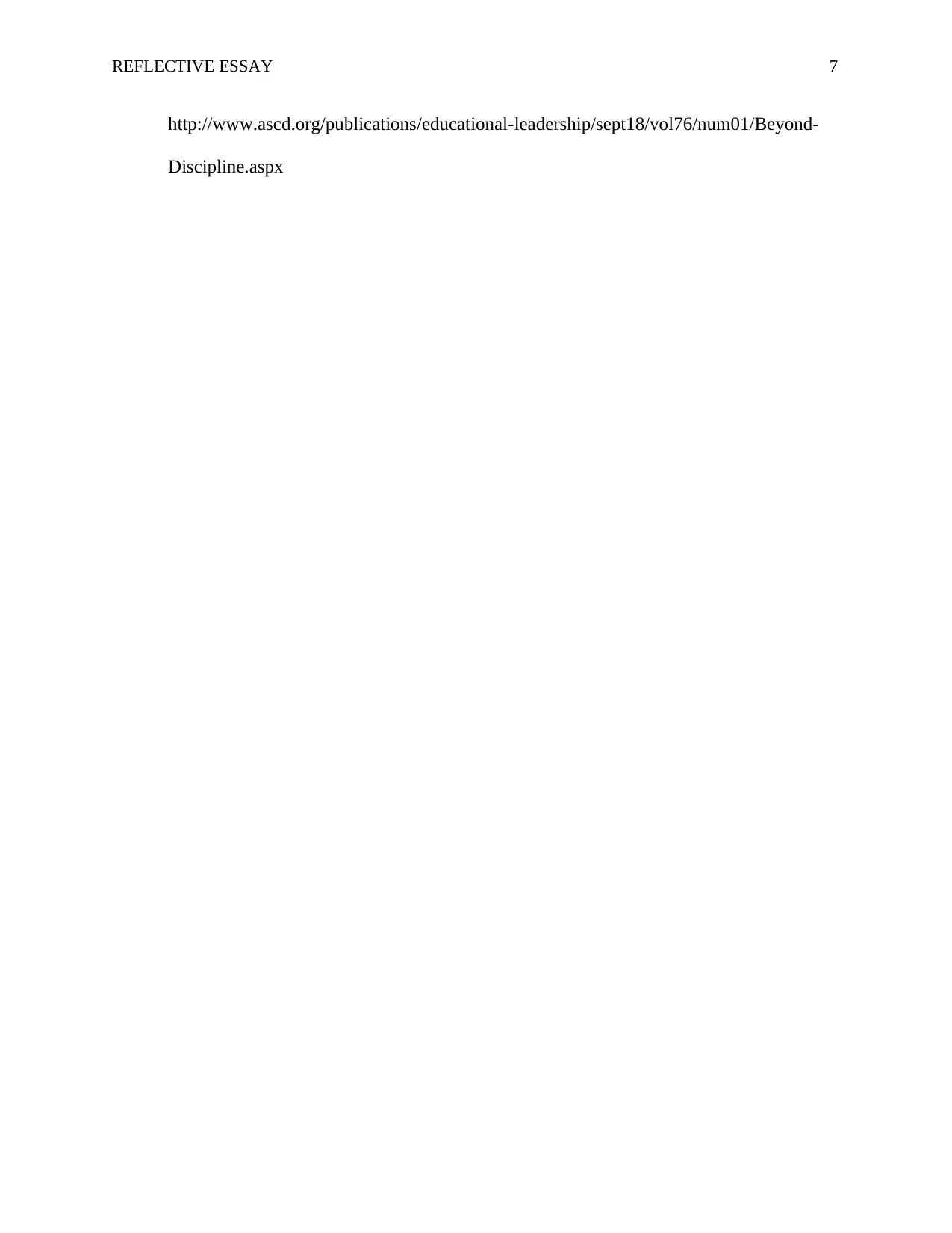
REFLECTIVE ESSAY 7
http://www.ascd.org/publications/educational-leadership/sept18/vol76/num01/Beyond-
Discipline.aspx
http://www.ascd.org/publications/educational-leadership/sept18/vol76/num01/Beyond-
Discipline.aspx
1 out of 8
Related Documents
Your All-in-One AI-Powered Toolkit for Academic Success.
+13062052269
info@desklib.com
Available 24*7 on WhatsApp / Email
![[object Object]](/_next/static/media/star-bottom.7253800d.svg)
Unlock your academic potential
Copyright © 2020–2025 A2Z Services. All Rights Reserved. Developed and managed by ZUCOL.





